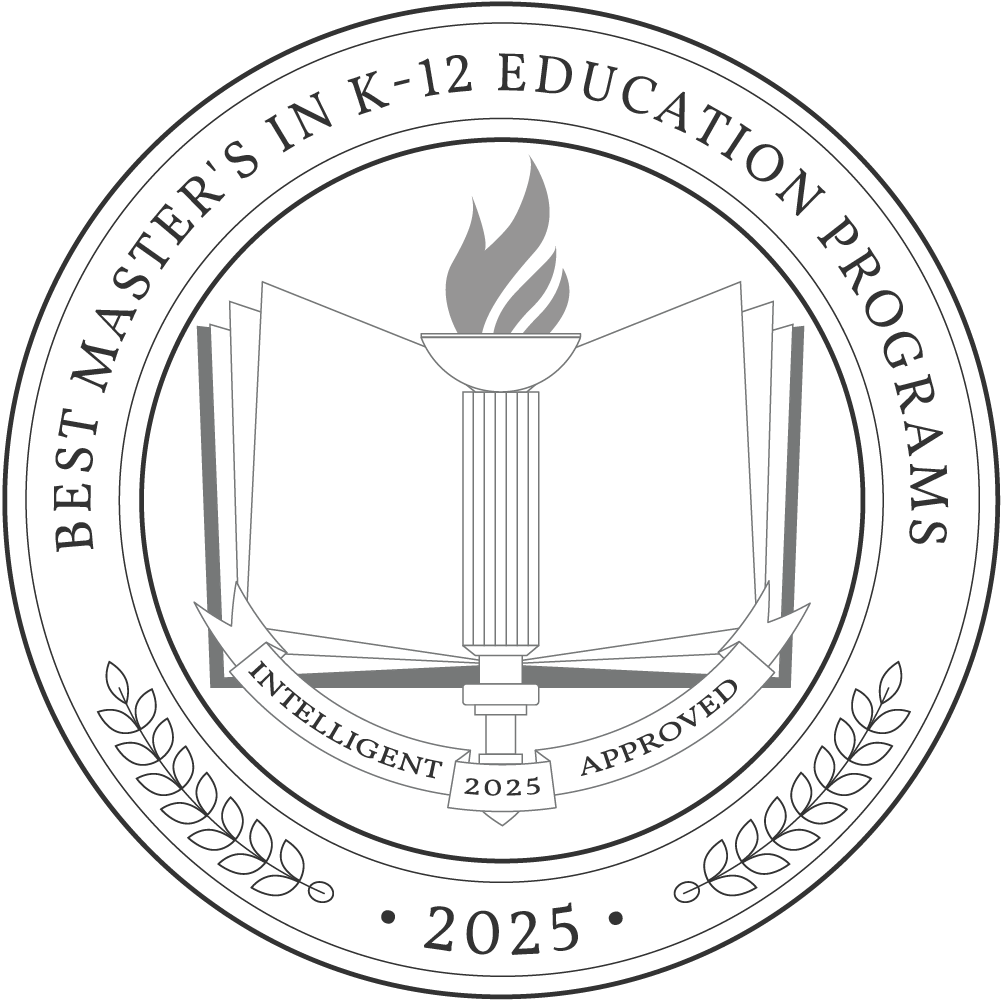A master’s in K-12 education program equips students with the knowledge and skills to excel in various roles within the education sector. Graduates are prepared for positions such as classroom teacher, curriculum specialist, instructional coordinator, or school administrator.
According to the Bureau of Labor Statistics, elementary school teachers earn an average salary of $63,670 per year, while secondary teachers earn a salary of 65,220 annually. Those in some locations or with extensive experience are likely to earn more. The program typically spans one to two years, depending on factors such as full-time or part-time enrollment and prior coursework. The National Center for Education Statistics reports that the average expense of this program is $12,000 to $30,000, though this can vary based on factors such as residency status and program features.
Why Trust Us
The Intelligent.com Higher Education Team is dedicated to providing students with independent, equitable school and program rankings and well-researched resources. Our expert-driven articles cover topics related to online colleges and programs, paying for school, and career outlooks. We use data from the U.S. Department of Education’s College Scorecard, the National Center for Education Statistics, and other reputable educational and professional organizations. Our academic advisory team reviews content and verifies accuracy throughout the year for the most current information. Partnerships do not influence rankings or editorial decisions.
- Analyzed over 2,000 national, accredited, and nonprofit colleges and universities
- 800+ rankings pages are reviewed and updated yearly
- Content is informed by reputable sources, surveys, and interviews with academic advisors and other experts
- Over 100 data points are reviewed for accuracy and quality throughout the year, including sources
How we rank schools
Our list features the best K-12 Education degree programs at top colleges nationwide. Each school featured is a nonprofit, accredited institution — either public or private — with a high standard of academic quality for post-secondary institutions.
We evaluated each school’s program on tuition costs, admission, retention and graduation rates, faculty, reputation, and the student resources provided for online students. We collected data from trusted sources like the National Center for Education Statistics, individual school and program websites, school admissions counselors, and other data sources. Then, we calculated the Intelligent Score on a scale of 0 to 100 based on the following criterion:
Academic Quality:
- Admission rate versus enrollment rate
- Retention rate of students who return after year one
- Accreditation status (regional and programmatic)
- Nonprofit status, both private and public institutions
Graduation Rate
- Overall graduation rate
- Total number of currently enrolled students, including diversity metrics
- Student-to-faculty ratio
Cost and ROI
- In-state and out-of-state per-credit tuition rates and fees
- Required credits to graduate
- Earning potential after graduation
- Availability of federal student loans, scholarships, and other financial aid options
Student Resources
- Available student services for online-only and hybrid programs
- On-campus amenities like tutoring centers and the number of libraries
Read more about our ranking methodology.
Best 4 Accredited Master's in K-12 Education Degree Programs
FiltersInstitution Type
Status
- Intelligent Score
- Alphabetically By University Name
- Acceptance Rate
- Enrollment
- In-state Graduate Tuition
- Out-of-state Graduate Tuition
- In-state Undergraduate Tuition
- Out-of-state Undergraduate Tuition

Boston University
Intelligent Score: 99.83In-state: $56,854
Out-of-state: $56,854
In-state: $56,854
Out-of-state: $56,854
SAT: 1310-1500
ACT: 30-34
$997
On-Campus
New England Commission of Higher Education
32-36

Harding University
Intelligent Score: 94.43In-state: $21,000
Out-of-state: $21,000
In-state: $11,388
Out-of-state: $11,388
SAT: 1060-1290
ACT: 21-29
$442
On-Campus
Council for Accreditation of Counseling and Related Educational Programs
35

Auburn University
Intelligent Score: 94.31In-state: $10,080
Out-of-state: $30,240
In-state: $10,080
Out-of-state: $10,080
SAT: 1160-1320
ACT: 25-31
Resident: $594
Non-Resident: $1,782
On-Campus, Online
Council for Accreditation of Counseling and Related Educational Programs
45-60

Missouri State University
Intelligent Score: 93.69In-state: $6,840
Out-of-state: $15,510
In-state: $5,436
Out-of-state: $5,436
SAT: 1020-1220
ACT: 21-27
Resident: $379
Non-Resident: $756
On-Campus
Higher Learning Commission
36
How to Choose a Master’s in K-12 Education Program
Choose your area of study
Begin your search by researching specializations, such as elementary education, secondary education, special education, or educational leadership. Consider factors like job market demand, salary prospects, and your passion for specific age groups or subject areas. Evaluate the institutions that offer likely programs, including each one’s curriculum, faculty expertise, and available resources like practicum opportunities or research centers. Reflect on your strengths, experiences, and long-term goals to guide your decision.
Research schools and programs
Begin your research by compiling a list of accredited institutions offering the program. Evaluate factors such as program reputation and available resources like practicum opportunities or partnerships with local schools. Explore each school’s website to gather information on curriculum details, specialization options, and program outcomes. Utilize online forums, educational publications, and alumni networks to gain insights into the student experience and program quality. Reach out to admissions offices or program coordinators to ask specific questions and request additional information.
Prepare for tests and applications
Begin by familiarizing yourself with program-specific admission requirements, including standardized tests like the GRE. Dedicate time to study for these exams using study guides, practice tests, and online resources. If you are uncertain about your test-taking skills, consider hiring a tutor or coach to help you practice. Gather all necessary documents, such as transcripts, letters of recommendation, or a compelling personal statement highlighting your passion for education. Pay attention to application deadlines and submit all materials well before deadlines. Consider seeking feedback on your application materials from mentors or advisors to ensure they effectively showcase your qualifications.
Select your program
Selecting the right master’s in K-12 education program is crucial for academic and career success. Consider factors such as program accreditation, specialization options, and faculty expertise in education. Evaluate each program’s curriculum, internship opportunities, and resources like research centers or partnerships with local schools. Reflect on your career goals and preferred roles within the field, and choose a school that offers the ability to work in your preferred area. Additionally, consider logistical factors like program location, format (online or on-campus), and cost. Reach out to current students or alumni for insights into their experiences.
Determine how you’ll pay for your degree
Complete the Free Application for Federal Student Aid (FAFSA) to determine your eligibility for federal student loans, grants, and work-study programs. Research scholarships, fellowships, and assistantships offered by your chosen school as well as other organizations. Explore tuition reimbursement programs through your employer or government agencies. Consider part-time work or internships in the field to gain experience and offset costs. Create a budget to manage expenses and prioritize financial aid options that minimize student debt. By leveraging available resources and planning ahead, you can make earning your degree in K-12 education more financially manageable.
What Can You Expect From a Master’s in K-12 Education Degree Program?
A master’s in K-12 education program provides prospective educators with a comprehensive understanding of educational theory, practice, and leadership within the K-12 setting. Students can expect to learn about curriculum development, instructional strategies, assessment techniques, classroom management, and educational technology integration.
The program typically takes one to two years to complete, depending on factors such as whether you attend full-time or part-time and any relevant prior coursework. You may have opportunities for hands-on teaching experiences through practicum placements or student teaching internships. Some programs may also require students to complete in-person labs, residencies, or fieldwork in local schools to gain practical skills and real-world experience. You should review program requirements carefully to ensure they meet all prerequisites and experiential learning requirements for admission to your chosen program.
Potential courses you’ll take in a master’s in K-12 education degree program
- Curriculum Development and Instructional Design. Covers theories and strategies for designing and implementing effective curriculum and instructional plans tailored to diverse student needs. Students learn to align curriculum with academic standards, integrate technology into instruction, and differentiate instruction to meet the needs of all learners.
- Classroom Management and Behavior Intervention. Explores theories and practices for creating positive and supportive classroom environments conducive to learning. Students learn strategies for managing student behavior, fostering positive relationships, and implementing behavior intervention plans to address challenging behaviors effectively.
- Assessment and Data Analysis in Education. Examines principles and practices of assessment, including formative and summative assessment methods, data collection techniques, and data analysis strategies. Students learn to design and administer assessments and use data to inform instructional decision-making and improve student learning outcomes.
- Educational Leadership and Administration. Provides an overview of educational leadership theories, principles, and practices, with a focus on school leadership, organizational management, and educational policy. Students explore topics such as instructional leadership, strategic planning, personnel management, and ethical leadership in educational settings.
- Special Education and Inclusive Practices. Explores principles and practices of special education, including laws and regulations, assessment and identification of students with disabilities, and evidence-based instructional strategies for supporting students with diverse learning needs in inclusive classrooms. Students learn to create inclusive learning environments that promote access, equity, and success for all learners.
Master’s in K-12 Education Degree Frequently Asked Questions
How do I apply to a master's in K-12 education degree program?
Review specific admission requirements for your chosen program. Typically, applicants need to submit an online application, official transcripts from previous academic institutions, letters of recommendation, and a statement of purpose outlining their interest in education. Some programs may also require GRE scores or proof of relevant work experience. It’s important to discuss program-specific requirements with an admissions counselor before applying to ensure all criteria are met. Admissions counselors can provide valuable guidance and support throughout the application process, helping applicants present their qualifications effectively and improve their chances of admission.
How much does a master's in K-12 education degree cost?
The cost of a master’s in K-12 education varies depending on factors such as institution, program format, and location. According to data from the National Center for Education Statistics, the average tuition ranges from $12,000 to $30,000. You will also need to budget for additional expenses such as textbooks, technology fees, and possibly residency or internship requirements. Online programs may offer tuition savings, but this depends on the program and other factors, and there may be additional technology or online learning platform fees to consider.
How long does it take to earn a master's in K-12 education degree?
The length of time it will take you to complete your degree depends on factors such as program format and enrollment status. Usually, full-time students complete a master’s degree program in one to two years, while part-time students are likely to take longer. Online programs may offer some flexibility, especially those offering asynchronous classes, but others can have similar completion times as on-campus programs. Some online programs may offer accelerated options. The total number of required credits may also impact program length.

